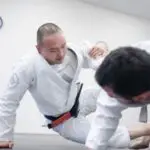
Are you eager to progress quicker in Jiu-Jitsu, but every time you add more classes it seems as though your body and/or mind cannot handle the additional load? There are ways to train more frequently; however, you must first pace yourself into a more frequent and intense training lifestyle. The next is to know how to avoid overtraining so you can continue training as often as you’d like!
To help keep overtraining under control it is important to get adequate rest each day. Sticking to a sleeping schedule and making time for a quick nap on more exhausting days will allow the mind and body to recover.
Staying hydrated and eating properly will fuel your body with the nutrients needed so your body can repair itself. you don’t expect your car to run without gas and oil, you can’t expect your body to run without water and food.
Aiding the body in recovery and doing injury prevention will allow your body to function longer and without injury. Stretching, massages and icing sore muscles will help maintain your body so it can continue to work.
Finally, training smart and varying the intensity in your training days will permit you to train more frequently. The classic train hard and take two rest days is the classic example of a maintainable training schedule. This can be adapted to have a schedule that may look like: hard, light, medium, light, hard. hard days being intense rolling days, light days being technical days, and medium being drilling days.
What Is Overtraining?
Overtraining is when you push your body to the point of exhaustion over some time. Overtraining occurs when a person exceeds their body’s ability to recover from exercise. In short, training too hard or for too long without allowing your body to properly recover.
There are seven symptoms to be aware of to avoid overtraining or know when it is set in.
- Muscle soreness
- Loss of motivation
- Sleep quality and insomnia
- Short on energy, or easily fatigued
- Emotional changes
- Injuries and increased injury frequency
- Results and performance decreasing
Is Overtraining A Myth?
Remember the fad on YouTube claiming overtraining is a myth? I sure do. The fact of the matter is you can overtrain if you do not allow yourself to properly recover. For me, the most apparent symptoms that arise are emotional changes and loss of motivation.
Can You Overtrain In BJJ?
The simple answer is, yes. Jiu-Jitsu involves a lot of gripping, pulling, pushing, explosive and dynamic movements. Training Jiu-Jitsu too frequently, especially when your body is not used to it, can lead to overtraining. The key to avoiding overtraining is to pace yourself to allow your body to adjust to the new movements.
Jiu-Jitsu is also a mentally demanding activity. The mind can get overwhelmed with all of the information it has to process. In addition to learning so much, putting it to practice in a physically demanding environment can be draining. Taking the time to let the information digest in your head can help a lot with progression and ensuring you do not burnout.
5 Tips To Avoid Overtraining
The most important aspect of any physically (and mentally) demanding activity, like Jiu-Jitsu, is recovery. The more you train the more time is needed for recovery.
- Sleep
- Hydration
- Nutrition
- Stretch, ice, and massage
- Develop a training schedule and train smart
The harder you train, the more you need to rest. Moreover, make sure you aren’t eating too little, and allow yourself the proper amount of time to recover from injuries. Even if you can’t stand being away from practice for more than a week, listen to your body. If your body needs rest, then let it be. If you hit the mats too early after an illness, you will squander all the energy your body has managed to create to fight off that illness, and use it to roll, which in turn, will just land you back on bed rest.
How can I tell if I’m overtraining? Is your appetite going down? Are you constantly short on energy, or easily fatigued? Cranky or unmotivated? Sore all over? Is your performance average to low? And most importantly, have you lost your love for training? If you feel any of the above, it’s a good idea to slow your pace way down.
1. Sleep
Sleep gives your body time to recover, repair and build up the damaged muscles. It is crucial for training recovery and helps with muscle repair after a strenuous workout. Keeping a consistent sleep schedule can help you stay on track and guarantee you’re getting the sleep you need each night. Additionally, if your day can allow it, having a quick 20-30 minute nap can help tremendously with rejuvenating yourself.
A lack of sleep can interfere with the body’s ability to recover and cause you to feel sluggish the next day. This can cause you to be more forgetful and get distracted easier, which is not good during Jiu-Jitsu when you’re trying to learn new techniques or strategize while rolling.
Sleep deprivation makes it difficult for the brain to communicate effectively, which can lead to temporary mental lapses that affect memory and visual perception.
Now think back to when you’re learning a new technique in class, it involves observing your instructor perform a technique, remembering how they performed it and then going through the actions yourself. If you haven’t had a restful night or you’re feeling drained from the amount of training you’re trying to do it may get hard to even participate in class effectually.
2. Hydration
Jiu-Jitsu tends to cause us to sweat, a lot. The more we train the more we have to keep our body hydrated. It can be easy to forget to drink enough water leading us to become dehydrated. Dehydration from overtraining causes physical stress to our body. Lack of hydration deprives our muscles and organs of the water they need to function effectively.
If you’re unsure if you’re dehydrated here are some signs to look for:
- Feeling thirsty and lightheaded
- Dry mouth
- Tiredness
- Dark-colored, strong-smelling urine
- Passing urine less often than usual
3. Nutrition
On average you can expect to burn 500-700 for 60 minutes of Jiu-Jitsu, or 700-1000 for 1.5 hours of Jiu-Jitsu.
Not eating enough food during the day can cause your body to go into a calory deficit. Losing weight requires a calory deficit just be sure it is not too large or it can become unhealthy. The more you train the more you’ll need to eat to ensure your body has enough food to repair the damaged muscles.
Overtraining can put your body in a catabolic state, which means your body is breaking down muscle tissue for fuel instead of fat or carbs. A simple breakdown of a healthy diet looks like the following:
- High-quality carbohydrates like whole grains, fruits, and vegetables.
- Lean protein sources, such as lean cuts of meat, poultry and fish, low-fat milk, and beans.
- Healthy fats from sources like nuts, olive oil, and avocados.
Eating healthy is easier to digest meaning your body can efficiently distribute them throughout your body to aid in recovery. Additionally, if you provide your body with efficient fuel to allow you to train longer and harder without going down the path of overtraining.
If you’re not convinced that eating healthy affects performance try eating healthy meals for a month. Then go out and have some fast food and unhealthy food and see how your performance is affected first hand!
How Do I Calculate The Calories Burnt?
The site BJJ Passion has a nifty online calculator that can help you get a rough estimate of how many calories you are burning during Jiu-Jitsu. Here’s a link to the calculator if you would like to try it out yourself.
Their calculator uses the following formulas to calculate the calories burnt during Jiu-Jitsu:
(Bodyweight x exercise calory type) / 60min * time spent on exercise type = calories burnt.
Example: (150lb x 1.81) / 60min * 10min = 45.25 calories burnt while stretching
- 1.81 calories – stretching:
- 2.43 calories – warm-up
- 3.25 calories – Light BJJ training
- 4.87 calories – Intensive BJJ training
4. Train Smarter
Train smarter may sound obvious, but its a very vague term. Training smart means to schedule and organize your training days to allow for effective recovery while getting the most out of training. Having back to back intense days with no rest days will lead to overtraining. Varying your training intensity through the week can allow you to train more often without rest days.
I’m able to train Jiu-Jitsu 6 times a week (I train twice on one day) because of my training schedule.
As an example, I train Monday, Wednesday, and Friday at 6:00 am. These classes are very technical where there is very little rolling if any. And the rolling that is done is situational where the teacher will stop us when he sees a learning opportunity so we can go through the position slowly.
The other 3 classes I attend are on Monday, Tuesday, and Thursday at 8:30 pm. Monday is technical with a high-intensity rolling session. Thursday class alternates each week between an intense rolling class and a technical drilling class. And Thursday is a technical flow rolling class.
If all of these classes were like my Monday night class I would not be able to train as much as I do. My body simply would not be able to handle it as I do not have the option to sleep during the day, time to stretch through the day or afford massages and physio to keep my body performing at that level.
5. Stretch, Ice, and Massage
Maintaining the body to prevent overtraining and injuries consists of stretching, massages, and icing. There are many benefits to these, but the main reason behind these is to help prevent the body from getting injured!
Stretching
Stretching keeps the muscles flexible, strong, and healthy, and we need that flexibility to maintain a range of motion in the joints. Without it, the muscles shorten and become tight. Then, when you call on the muscles for activity, they are weak and unable to extend all the way. That puts you at risk for joint pain, strains, and muscle damage.
Massage
Massage therapy increases circulation, relieve tension, reduce stress, relieve anxiety, improve sleep, and promote relaxation throughout the entire body, which all help with recovery and injury prevention. Whether chronic or acute, if you’re tense or have knots in your muscles, getting a massage can make a world of difference.
Massages can be used to help muscle or nerve tissue damage. They will decrease muscle stiffness and increase range of motion too. Finally, since this section is about maintaining the body, massages can be used as a preventative measure for future problems.
Every few months I get a massage as I always get a giant knot in my back. As the knot gets worst I can feel it pulling my should, neck and arms during rolling. I also attribute getting arm massages to reliving the tendonitis that I had in arms from chronic to manageable.
Ice
Ice can help treat a swollen and inflamed joints or muscles. It is most effective within 48 hours of an injury. Rest, ice, compression and elevation (RICE) are part of the standard treatment for injuries.
The cold treat helps reduce blood flow to the inflamed muscle, which in turn reduces the risk of swelling and tissue damage. The greater the tissue damage the more time is required for the tissue to heal. The ice will also numb the sore area which can help with pain management.
My Experience With Overtraining In Jiu-Jitsu
When I first started Jiu-Jitsu I tried to train Jiu-Jitsu twice, along with MMA three times (the MMA class I went to was heavy in grappling that week), Muay Thai twice; all in one week! Needless to say, I destroyed my body, especially the tendons in my arms.
I was used to working out 4-5 times a week with each workout being 1.5-2 hours long. I thought that my body was used to strenuous activities as my workouts were generally challenging always using heavyweights. What I didn’t anticipate were how the new, dynamic movements I would starting using due to grappling.
I took a week off to allow my arms to function normally again. After this experience I backed off with training; however, it took me some time to train more than twice a week. Any time I tried to train 3 times a week my tendons would not recover sufficiently between Jiu-Jitsu classes.
Another time that I have felt overtrained was when I started doing 6 classes a week, swimming twice a week and going to the gym twice a week. After 3 weeks of following this type of schedule, I noticed that I was very snappy with others and started to not look forward to Jiu-Jitsu. I took a few days off and the next week I felt refreshed and ready to train hard again.
Conclusion
To avoid overtraining is to first change your lifestyle to allow for better recovery. Without proper recovery, you will always end up overtraining.
There will be times that a de-load week may be needed to allow your body to fully recover, so always listen to your body when in doubt. It’s important to recognize the symptoms of overtraining so you can address them quickly to prevent loss training time.
Overtraining can be avoided by getting adequate rest, drinking plenty of water to stay hydrated, eating nutritious food to repair the body, maintaining the bodies functionality with stretching, massages, and injury prevention like icing inflamed muscles), and finally, keeping a realistic training schedule by varying the intensity of training days.


